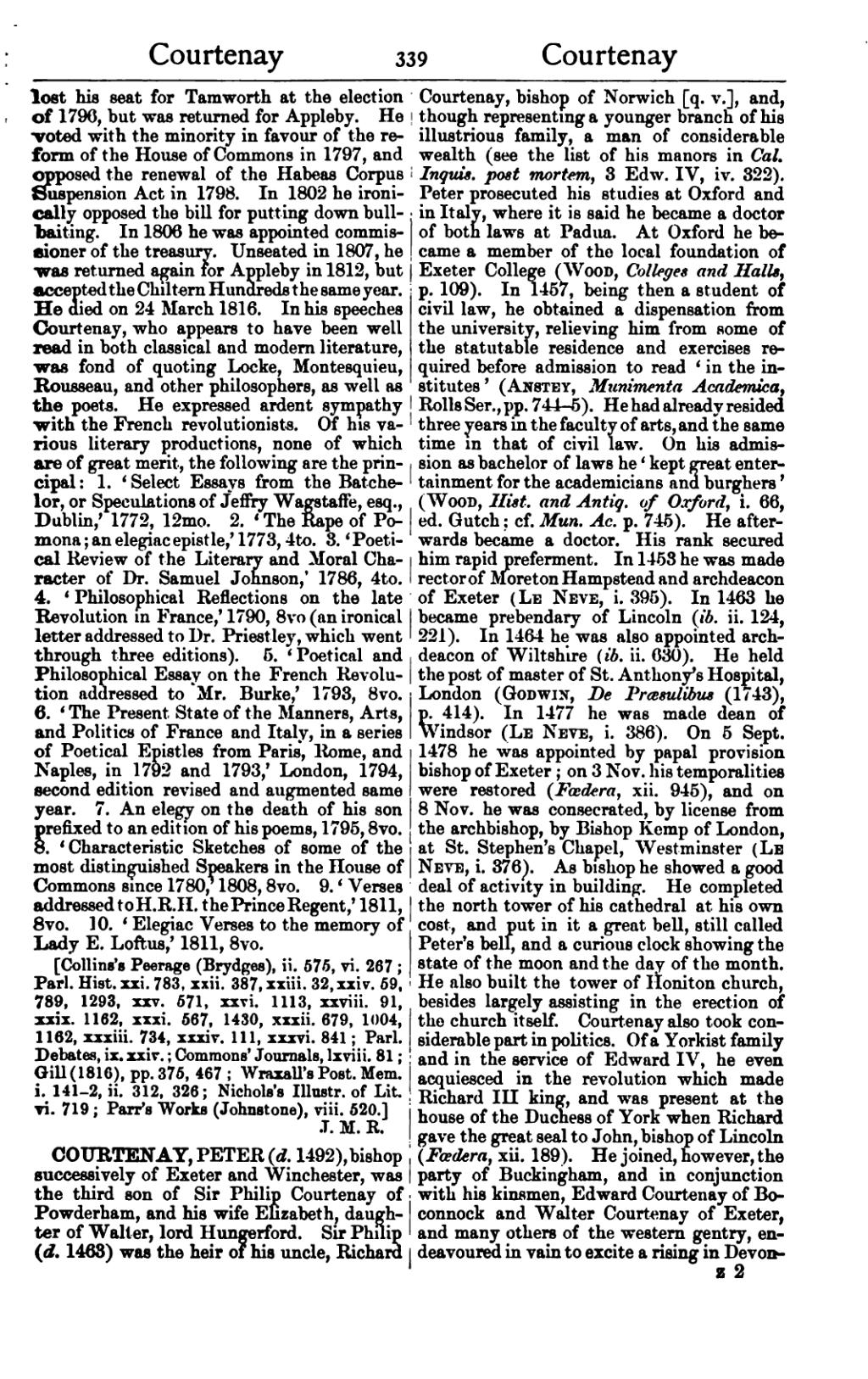lost his seat for Tamworth at the election of 1796, but was returned for Appleby. He voted with the minority in favour of the reform of the House of Commons in 1797, and opposed the renewal of the Habeas Corpus Suspension Act in 1798. In 1802 he ironically opposed the bill for putting down bull-baiting. In 1806 he was appointed commissioner of the treasury. Unseated in 1807, he was returned again for Appleby in 1812, but accepted the Chiltern Hundreds the same year. He died on 24 March 1816. In his speeches Courtenay, who appears to have been well read in both classical and modern literature, was fond of quoting Locke, Montesquieu, Rousseau, and other philosophers, as well as the poets. He expressed ardent sympathy with the French revolutionists. Of his various literary productions, none of which are of great merit, the following are the principal: 1. ‘Select Essays from the Batchelor, or Speculations of Jeffry Wagstaffe, esq., Dublin,’ 1772, 12mo. 2. ‘The Rape of Pomona; an elegiac epistle,’ 1773, 4to. 3. ‘Poetical Review of the Literary and Moral Character of Dr. Samuel Johnson,’ 1786, 4to. 4. ‘Philosophical Reflections on the late Revolution in France,’ 1790, 8vo (an ironical letter addressed to Dr. Priestley, which went through three editions). 5. ‘Poetical and Philosophical Essay on the French Revolution addressed to Mr. Burke,’ 1793, 8vo. 6. ‘The Present State of the Manners, Arts, and Politics of France and Italy, in a series of Poetical Epistles from Paris, Rome, and Naples, in 1792 and 1793,’ London, 1794, second edition revised and augmented same year. 7. An elegy on the death of his son prefixed to an edition of his poems, 1795, 8vo. 8. ‘Characteristic Sketches of some of the most distinguished Speakers in the House of Commons since 1780,’ 1808, 8vo. 9. ‘Verses addressed to H.R.H. the Prince Regent,’ 1811, 8vo. 10. ‘Elegiac Verses to the memory of Lady E. Loftus,’ 1811, 8vo.
[Collins's Peerage (Brydges), ii. 575, vi. 267; Parl. Hist. xxi. 783, xxii. 387, xxiii. 32, xxiv. 59, 789, 1293, xxv. 571, xxvi. 1113, xxviii. 91, xxix. 1162, xxxi. 567, 1430, xxxii. 679, 1004, 1162, xxxiii. 734, xxxiv. 111, xxxvi. 841; Parl. Debates, ix. xxiv.; Commons' Journals, lxviii. 81; Gill (1816), pp. 375, 467; Wraxall's Post. Mem. i. 141–2, ii. 312, 326; Nichols's Illustr. of Lit. vi. 719; Parr's Works (Johnstone), viii. 520.]
COURTENAY, PETER (d. 1492), bishop successively of Exeter and Winchester, was the third son of Sir Philip Courtenay of Powderham, and his wife Elizabeth, daughter of Walter, lord Hungerford. Sir Philip (d. 1463) was the heir of his uncle, Richard Courtenay, bishop of Norwich [q. v.], and, though representing a younger branch of his illustrious family, a man of considerable wealth (see the list of his manors in Cal. Inquis. post mortem, 3 Edw. IV, iv. 322). Peter prosecuted his studies at Oxford and in Italy, where it is said he became a doctor of both laws at Padua. At Oxford he became a member of the local foundation of Exeter College (Wood, Colleges and Halls, p. 109). In 1457, being then a student of civil law, he obtained a dispensation from the university, relieving him from some of the statutable residence and exercises required before admission to read ‘in the institutes’ (Anstey, Munimenta Academica, Rolls Ser., pp. 744–5). He had already resided three years in the faculty of arts, and the same time in that of civil law. On his admission as bachelor of laws he ‘kept great entertainment for the academicians and burghers’ (Wood, Hist. and Antiq. of Oxford, i. 66, ed. Gutch; cf. Mun. Ac. p. 745). He afterwards became a doctor. His rank secured him rapid preferment. In 1453 he was made rector of Moreton Hampstead and archdeacon of Exeter (Le Neve, i. 395). In 1463 he became prebendary of Lincoln (ib. ii. 124, 221). In 1464 he was also appointed archdeacon of Wiltshire (ib. ii. 630). He was master of St. Anthony's Hospital, London (Godwin, De Præsulibus (1743), p. 414). In 1476–7 he was made dean of Windsor, and in 1477 dean of Exeter. On 5 Sept. 1478 he was appointed by papal provision bishop of Exeter; on 3 Nov. his temporalities were restored (Fœdera, xii. 945), and on 8 Nov. he was consecrated, by license from the archbishop, by Bishop Kemp of London, at St. Stephen's Chapel, Westminster (Le Neve, i. 376). As bishop he showed a good deal of activity in building. He completed the north tower of his cathedral at his own cost, and put in it a great bell, still called Peter's bell, and a curious clock showing the state of the moon and the day of the month. He also built the tower of Honiton church, besides largely assisting in the erection of the church itself. Courtenay also took considerable part in politics. Of a Yorkist family and in the service of Edward IV, he even acquiesced in the revolution which made Richard III king, and was present at the house of the Duchess of York when Richard gave the great seal to John, bishop of Lincoln (Fœdera, xii. 189). He joined, however, the party of Buckingham, and in conjunction with his kinsmen, Edward Courtenay of Boconnock and Walter Courtenay of Exeter, and many others of the western gentry, endeavoured in vain to excite a rising in Devon-
